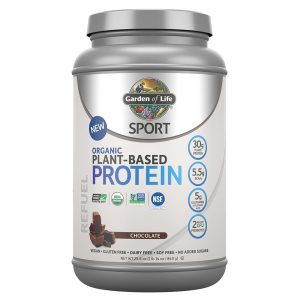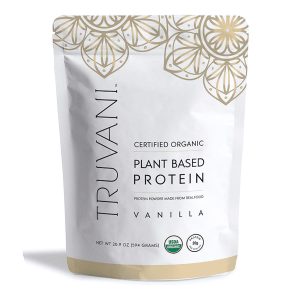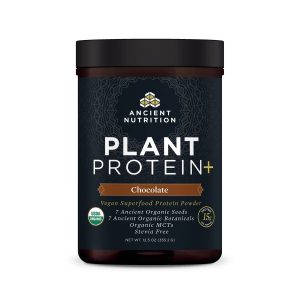Many people have moved to plant based diets for health reasons. Whether it involves food intolerance or preferences, it’s always important to ensure you get adequate nutrients. And that leads to many questions about plant based proteins. That’s because proteins are the building blocks for our cellular health.
The Mayo clinic recently published an article stating between 10% – 35% of our calories should come from protein. And we published an article earlier this year discussing how to calculate the amount of protein you need. If you’ve moved to a plant based diet, reaching those protein goals can feel difficult to achieve.
But don’t fear. We believe our plant based friends can still get adequate amounts of protein in their diets. And that’s why we’re here to answer your biggest questions about plant based proteins and protein supplements.
Let’s dive in.
How does Plant Protein compare to Animal and Whey?
We’d love to give you a simple answer to this question. Unfortunately, a simple answer doesn’t exist. Plant protein supplementation is a relatively new invention, outside of soy. Therefore, we currently lack many long-term studies compared to animal protein. The largest study to date ranks plant protein in the form of soy as the 3rd best source of protein.
Most plants do not offer the full spectrum of amino acids individually. Subsequently, most plant proteins do not rank higher on the list of great sources of protein. The primary exception to that rule is soy.
We agree soy offers plant based eaters an invaluable source of protein, except, try finding clean-sourced soy. So, how do you get enough protein if you follow a plant based diet?
Many different forms of plant protein powders do have blends of plant sourced amino acids. That helps make up for the lack of naturally occurring, full spectrum amino acid profiles that animal and soy proteins contain. This is good news because many people battle intolerances of animal and soy proteins.
So, while the literature doesn’t rank plant protein as top contenders, many people can use plant protein powders to help them reach their daily protein goals.
Why not Soy?
Fair question! Soy seems like the perfect alternative to animal proteins. However, like we said before, acquiring clean soy gets pretty darn difficult. Not as difficult as finding a roll of toilet paper during a pandemic, but still…
Over 95% of soy crops are GMO (genetically modified), which means it cannot be classified as organic. The organic label is one of the labels that certifies growers haven’t used toxic pesticides and herbicides on our food, such as Gyphosate, aka Roundup. So, no organic label means it’s tough to know if the product is clean or not.
Furthermore, there is, albeit conflicting, evidence that soy protein may negatively impact a certain population’s hormone production. Those who should be specifically cautious include men and women at risk for certain types of estrogen propelled cancers with GMO soy.
What should I look for in a quality plant protein?
Is it organic?
The number 1 thing to look for in your plant based proteins is organic certification. Due to the nature of harvesting practice with most plants an organic certification is essential to determine high quality plant matter of any kind. This also means that it will be non-gmo.
Look for variety.
Second, look for variety in amino acid sources. In other words, how many plant extracts does the brand use?
The most common sources are brown rice and pea plants. Are these bad? No, not necessarily.
These two sources of protein do raise concerns. The problem most commonly associated with brown rice, when used alone, is heavy metal contamination. Pea protein has absorption problems.
That’s why many companies, namely my personal favorite Truvani, source multiple types of plant and vegetable, even fruit material to construct a very bioavailable and easily digestible protein blend. Using less rice also ensures a lower likelihood of heavy metal contamination.
Don’t add sugars.
Third, make sure there are no added sugars. While trace amounts of naturally occurring sugars don’t pose too many problems, added sugars = unnecessary sugars. Save the additional sugar content for berries or some type of low glycemic fruit to add into a smoothie.
Watch the iron.
Lastly, look to make sure the plant proteins do not contain excessive iron levels. High blood iron is very risky for our long term health.
Learn more about iron overload here.
How do I mix the protein?
A very common question we often get is, “how do I mix the protein.” Personally, if I am using a plant based protein I prefer to blend it in a smoothie. Most companies make their proteins “instatized” meaning they will mix fairly well just by shaking them in a bottle. Plant proteins tend to get a bad reputation for being thick and chunky, though most companies have overcome this predicament in recent years.
However, there is a very explainable reason for why this may occur. Many companies use, as stated above, numerous protein sources to construct a high quality protein powder. This may entail plants that have mild to moderate thickening properties like chia, flax, hemp and others. A simple solution is to add a non-thickening liquid to mix the protein with or just blend it. The small amount of extra effort is definitely worth it because having a protein powder with a variety of sources of amino acids, as I mentioned previously, ensures in most cases a much higher quality protein option.
Will it help me lose weight?
As a Nutritionist, I recommend high(er) protein meals for the majority of my clients. Not as a sweeping general requirement or dogmatic belief system, but rather as a way to combat the extremely common issue of protein deficient lifestyles that most people have. In my experience, once I am able to fortify a client’s daily protein intake, they almost always lose body fat and reduce cravings!
One way we accomplish this goal is to add a shake supplement to their daily regimen. Not to mention something called the thermic effect of food. This is the term used to describe the amount of energy required to metabolize certain nutrients. Of all nutrients, protein has the highest thermic effect! That is to say, it requires more energy to break down and absorb than all the other macronutrients.
Protein from any source added into a daily regimen should also help to reduce hunger, increase satiation (fullness) and improve insulin response. All of these effects work synergistically to aid in weight loss.
Can I build muscle with plant protein?
I don’t know, can you build muscle with plant protein?
I actually love this question. If a plant protein has enough amino acids, primarily the branched chain amino acids Leucine, Isoleucine, and Valine, you should be able to build muscle using it. The real question is whether or not your digestive system can do its job. If not, you might need digestive enzymes.
The study I referenced above does hold animal sourced protein at a higher ranking for muscle building but that should not deter you. Electric cars use less gas per mile, but that doesn’t mean everyone must drive one, right?
I have had many clients that strictly rely on plant protein as a muscle building supplement, and they have had great success. My general opinion is that so long as you are eating enough protein and absorbing it adequately, when paired with adequate recovery and exercise you should have no problem building muscle. Of course, there is a ton of nuance to this particular discussion, but rest assured the best foundational supplement to any muscle building program is a quality protein powder.
As long as you're eating enough protein and absorbing it adequately, when paired with appropriate recovery and exercise you should have no problem building muscle. Share on XWhat is your favorite brand(s)?
I can’t really choose just one so I will give my top 3 favorite plant based protein powder brands, in no particular order.
Garden of Life Protein Powder
Old reliable as I’ll refer to this first option would h
Truvani

Ancient Nutrition Plant Protein

I hope this has answered many of your questions about plant based protein choices. As always please remember that Nutrition World has the highest standards in the country for the brands we represent so you are in good hands on your journey to health.


